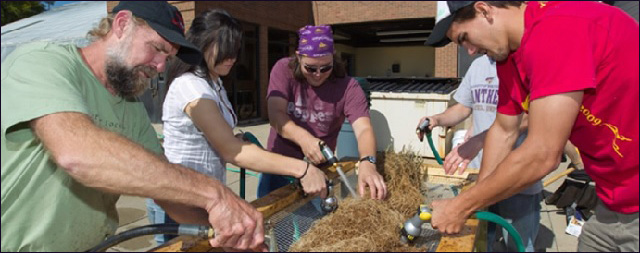
Undergraduate Student Work
Work/Availability
Open Access Undergraduate Student Work
Type of Work
Poster Presentation
Keywords
Butterflies--Habitat--Iowa; Plant species diversity--Iowa; Prairie plants--Iowa;
Abstract
In the Midwestern USA, current biofuel production systems rely on high input monoculture crops that do little to support biodiversity or protect soil and water resources. The University of Northern Iowa’s Tallgrass Prairie Center is investigating the feasibility of cultivating and harvesting diverse mixes of native prairie vegetation as a sustainable biofuel. In 2009, we established 48 research plots seeded with one of four treatments: 1) switchgrass monoculture, 2) warm-season grass mix (5 species), 3) biomass mix (16 species of grasses and forbs), or 4) prairie mix (32 species of grasses and forbs). We hypothesized that more diverse plant communities would support a greater abundance and diversity of butterflies. In 2010, just the second growing season after seeding, butterflies were six times more abundant and twice as species rich in biomass and prairie mix plots compared to warm-season grass and switchgrass plots. Our results suggest that implementation of biomass production using diverse mixes of native prairie vegetation on marginal lands could have positive effects on the maintenance of biodiversity in agricultural landscapes.
Date of Work
2010
Department
Department of Biology
Department
Tallgrass Prairie Center
First Advisor
Mark C. Myers
Repository
UNI ScholarWorks, Rod Library, University of Northern Iowa
Copyright
©2010 Benjamin J Hoksch, Dr. Mark C Myers
Language
en
File Format
application/pdf
Recommended Citation
Hoksch, Benjamin J. and Myers, Mark C., "Butterfly response to floral resources at a heterogeneous prairie biofuel production site" (2010). Undergraduate Student Work. 31.
https://scholarworks.uni.edu/ugswork/31


